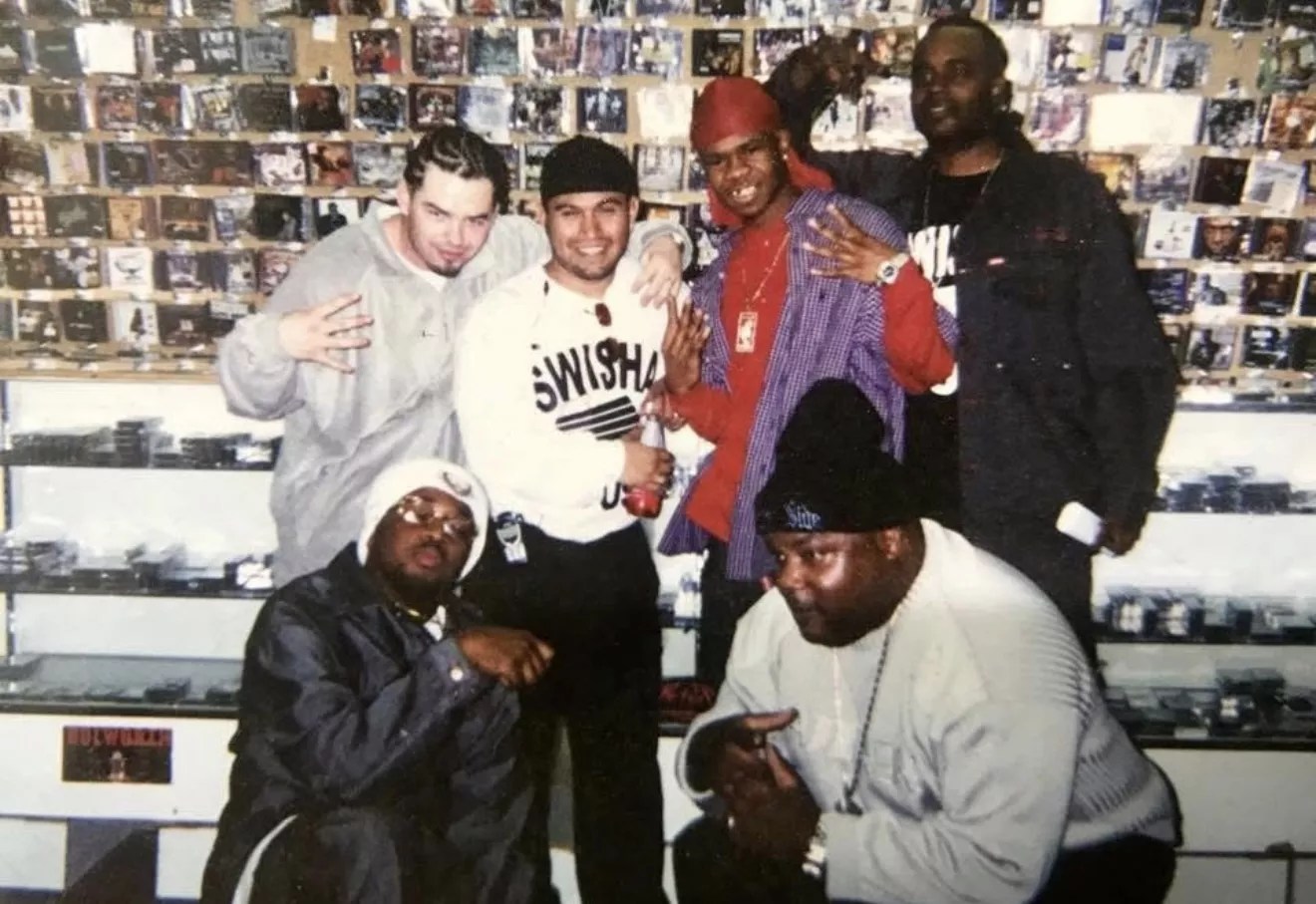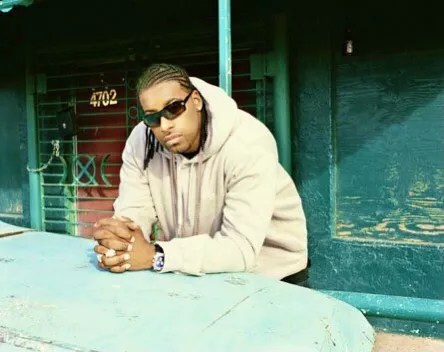
Courtesy of George Lopez

Audio By Carbonatix
A beloved Dallas music store is saying goodbye. T-Town Music, which offered a vast collection of hip-hop records by independent artists, will close its doors on Sunday, March 30, after 31 years in business.
A staple of Pleasant Grove’s Bruton Bazaar, T-Town Music was a haven for Dallas rap fans, who came to the store to purchase the albums, EPs and mixtapes they couldn’t find at the big music retailers. Driven by passion and a pure love of the game, owner George Lopez (not the comedian) prioritized the artists and their craft, bringing the music directly to the fans.
Lopez first opened T-Town Music back in 1994 after he was laid off from an auto parts shop. While losing his job wasn’t ideal, Lopez knew that his next move would involve music. By that time, he had 11 years of experience as a DJ and was knowledgeable in a wide array of sounds.
“I wasn’t just one type of DJ,” Lopez says. “I did it all. I’m talking about R&B, funk, rap, country, classical. I was playing jazz because I was doing a lot of weddings and quinceañeras. So, music has always been in me. If I was going to do anything else after a regular job, I was going to open my own record store.”
Building T-Town Music from the ground up was no easy task. Lopez’s father owned a construction company, where Lopez would work during the day to earn money to fund and maintain the shop.
“I worked [construction], got paid, put that money toward buying CDs and tapes while my clientele was still building,” says Lopez. “That was the hard part, working from 6 in the morning till the afternoon, going home, changing, then coming back to T-Town, and staying at the Bazaar till 9 o’clock to sell whatever I ordered that week.”
In its early years, T-Town would open around 3 p.m., in time for the nearby high schools to let out. One of T-Town’s earliest customers was rapper Big Tuck. Before he became a rapper, Tuck would frequent T-Town to purchase mixtapes from New Orleans hip-hop collective No Limit, founded by Master P.
Tuck was also working freelance DJ gigs, and would use the money he made to purchase physical music releases from local music distributors. Some of Tuck’s fondest memories include popping into the store with friends, and passing time at Bruton Bazaar.
“That was the hangout spot,” Tuck says. “We’d go up there and play pool every week, and we’d talk and listen to music for hours.”
Lopez says it took “about five to six years” to get T-Town Music off the ground. From the very beginning, he had built strong relationships with label No Limit and with the Houston-based Swishahouse and Rap-A-Lot.
He and his cousin Trini Delgado eventually formed their own label and imprint, T-Town Records, and formed the group Dirty South Rydaz in 2001. DSR was composed of rappers Fat Bastard, Tum Tum, Addiction, Thrilla, Double T and Big Tuck.
Through camaraderie, Lopez and Delgado were able to get many rappers from the Houston-based labels onto the early T-Town Records and DSR compilations and mixtapes. Soon after, T-Town and DSR would impact the Dallas rap scene.
“I remember getting DSR CDs and always seeing T-Town on them,” says rapper Dorrough. “DSR was a big influence on me, and T-Town was behind them.”
In the years following, T-Town and its artists were in heavy rotation on Dallas radio. Songs such as Big Tuck’s “Southside Da Realist” and Tum Tum and Fat Bastard’s “Man Hold Up” were undeniable hits. While these songs proved successful among the Dallas crowd, Lopez was determined to give these artists a national presence.
Lopez would often drive across the country and visit various independent record stores in hopes they would choose to carry the T-Town Records and DSR mixtapes.
Da Realist
“I learned a lot from Master P,” Lopez says, “because he was coming out of New Orleans, and he was driving to California, like, once a month. Seeing that work ethic – coming from New Orleans through Texas, all the way through New Mexico, Arizona, California – he was building an empire with No Limit Records.

Big Tuck made rap history with T-Town Music.
Jonathan Mannion
So I started doing the same thing when we made our label. I was like, ‘We’ll go to all these cities, and if people didn’t know who DSR was, I was like, ‘OK, I’m just going to leave you the product. It’s going to grow, and it’s going to sell one day in your store.'”
Platforming independent hip-hop artists is what kept T-Town Music alive through a rapidly evolving music landscape. In the early 2000s, programs like Napster became a threat to artists, as music fans used them to download music for free. The introduction of iTunes in 2001 also posed a threat, as music fans could purchase individual tracks from albums, as opposed to buying a physical album in full.
But hip-hop heads knew that T-Town Music had the projects they couldn’t find anywhere else.
“People quit buying CDs,” says Lopez, “So at T-Town Music, we said, ‘You know what? Everyone’s downloading Jay-Z, Eminem, and all those mainstream artists.’ But they weren’t downloading Swishahouse, DSR or all of these independent artists in Texas. So we won for an extra few more years, and then iTunes came in. We were still winning because at that time, the music wasn’t being distributed through the major platforms. People didn’t come to use for the new Jay-Z albums, they wanted the new Slim Thug or Pimp C mixtapes.”
But toward the end of the decade, many independent artists signed to major labels. If not inking a big record deal, they ended up selling their mixtapes on iTunes, or uploading them to platforms like DatPiff for fans to download for free.
Now, many artists release their mixtapes through streaming platforms, which partly diminishes the underground appeal. Lopez feels that in the age of streaming, physical media still matters. He also believes platforms like Spotify are doing more harm than good to artists.
“They kill the artists,” says Lopez of DSPs. “I mean, there are pros and cons. People are like, ‘Oh, I’m getting a play in Japan, which I would have never gotten if it weren’t for Spotify.’ Yes, but Spotify is winning over you, because now that 20 spins you picked up last month at Spotify in Japan equates to maybe a penny. Besides getting your name out there, it benefited you by a penny, money-wise. But if you were still independently selling your CDs, you could’ve made more. Streaming is not paying the artists what they put in. Even if they put the album together for $5,000, you’ve got to sell a million streams to get your $5,000 back. It’s not benefiting the artist at all.”
Both Tuck and Lopez say that physical media is still valuable and that independent artists should still invest in these components in order to solidify their artistic vision.
“These artists, they’re just gonna have to learn to work three times harder. Make a CD, make a USB, still be on a platform, still shake hands, still do independent shows,” Lopez says.
Thankfully, T-Town Music will still be making mixtapes and USBs (ideal for DJing and cars without CD players) until its closing day.
Though we may only be days away from the end of an era, Lopez’s mission to elevate independent artists continues. After T-Town closes, Lopez will continue to manage and book artists across various venues, and help local acts get their music on radio stations and to various promoters.
The absence of T-Town will certainly be felt, but its impact will not be forgotten.
“I feel like the T-Town name will never leave the music scene,” says Tuck. “T-Town will always in the background somewhere, whether it’s hosting these tapes, or podcasts, or clubs. T-Town brought the stars from Texas together, so it will always be a landmark in Dallas. It’s legendary, and it’ll always be legendary. And I’m thankful for being a part of the T-Town family.”